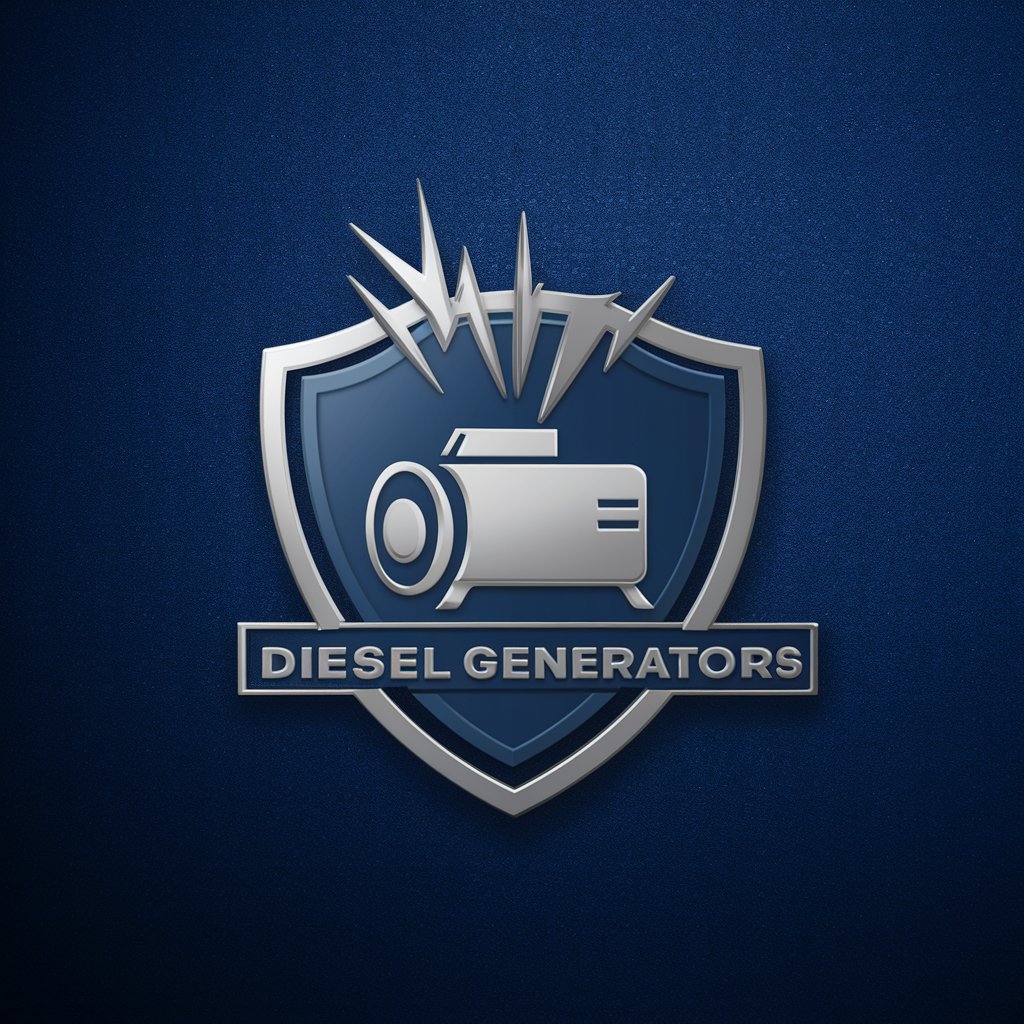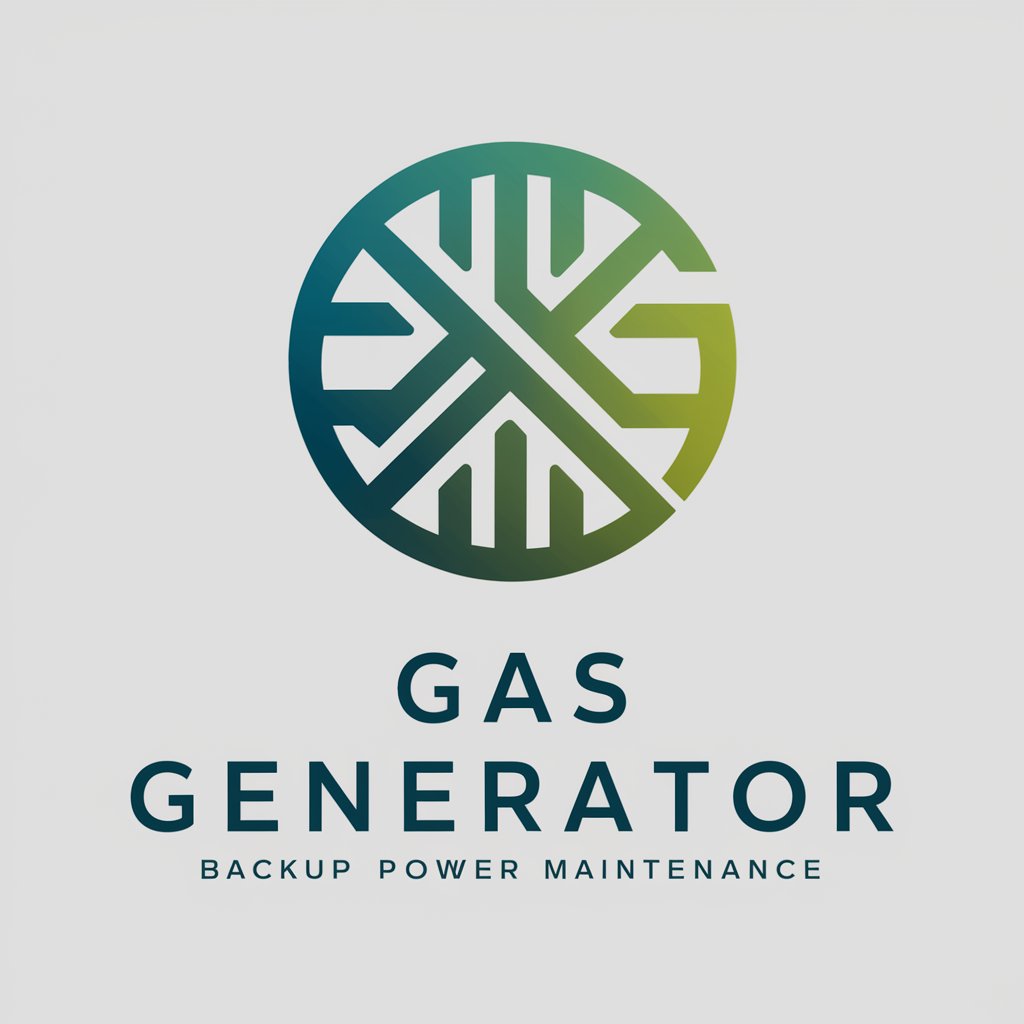
Diesel Generator - Expert Generator Guidance

Welcome! I'm here to help with all your diesel generator needs.
Powering Your Needs with AI
How do I maintain my diesel generator to ensure long-term reliability?
What are the key differences between diesel and gasoline generators?
Can you explain the steps to safely operate a diesel generator during a power outage?
What are the common issues with diesel generators and how can I troubleshoot them?
Get Embed Code
Overview of Diesel Generators
A diesel generator is a combination of a diesel engine with an electric generator (often an alternator) to generate electrical energy. This is a specific case of engine-generator. A diesel compression-ignition engine is usually designed to run on diesel fuel, but some types are adapted for other liquid fuels or natural gas. Diesel generators are used in places without connection to a power grid, or as emergency power-supply if the grid fails, as well as for more complex applications such as peak-lopping, grid support, and export to the power grid. They are available in a range of sizes from small portable units that provide a few kilowatts to large industrial generators that can provide several megawatts of power. Examples of scenarios where diesel generators are crucial include providing backup power for hospitals, commercial buildings during power outages, remote construction sites where grid power is unavailable, and as primary power sources in areas without grid connectivity like remote villages or islands. Powered by ChatGPT-4o。

Core Functions of Diesel Generators
Emergency Power Supply
Example
Hospitals and emergency response centers
Scenario
In the event of a power outage, diesel generators are activated to ensure that critical systems such as life support machines, lighting, and communication networks remain operational, ensuring patient safety and continuity of care.
Remote Power Supply
Example
Construction sites, mining operations, and oil rigs
Scenario
In remote areas where grid power is not accessible, diesel generators serve as the primary power source to run heavy machinery, tools, and provide lighting, enabling operations in isolated locations.
Peak Lopping
Example
Manufacturing plants and large commercial facilities
Scenario
During periods of high demand where the power drawn from the grid is at its peak, diesel generators are used to provide additional power to prevent overloading the grid and to reduce electricity costs associated with peak tariffs.
Grid Support
Example
Utility companies
Scenario
Diesel generators can be used by power utilities to manage the grid's load and supply balance, especially during times of high demand or when renewable energy sources like wind or solar are not generating sufficient power.
Target User Groups for Diesel Generators
Industrial and Commercial Enterprises
Businesses that require uninterrupted power to maintain operations, such as manufacturing plants, data centers, and retail complexes. Diesel generators ensure business continuity during outages, preventing data loss, spoilage of perishable goods, and downtime costs.
Healthcare Facilities
Hospitals, clinics, and nursing homes where power reliability is critical for patient care and safety. These facilities use diesel generators to power essential medical equipment and systems during emergencies.
Remote Operations
Entities operating in isolated areas such as mining companies, oil and gas exploration firms, and construction projects in remote locations rely on diesel generators as their primary power source to support their operations.
Emergency and Disaster Response Units
Organizations such as FEMA, fire departments, and military units that require mobile, reliable power sources for emergency response and disaster relief operations. Portable diesel generators provide the necessary power to support these critical missions.

How to Use Diesel Generator
Start with a Trial
Begin by accessing a free trial at yeschat.ai, without the need for login or subscribing to ChatGPT Plus.
Understanding the Basics
Familiarize yourself with diesel generator operation principles, including starting procedures, load management, and emergency shutdown processes.
Safety First
Ensure safety by checking that the generator is in a well-ventilated area, performing pre-operation inspections, and wearing appropriate protective gear.
Operation and Monitoring
Start the generator following the manufacturer's instructions, gradually add load as the generator stabilizes, and monitor performance and fuel levels continuously.
Maintenance and Troubleshooting
Regularly perform maintenance tasks as recommended by the manufacturer and learn basic troubleshooting for common issues like failure to start, fluctuating power output, or unusual noises.
Try other advanced and practical GPTs
Compliance Buddy
Navigating Compliance with AI Precision

WCAG-GPT
Empowering Web Accessibility Through AI

Job Search Slot Machine
Your AI-powered career matchmaker.

GPT Trainer Pro
Empowering Effective Learning with AI

Scientific Translator
Translating Science, Enhancing Understanding

Kanjiya Positive Kanji and Like a lesson learned.
Empowering Japanese language mastery with AI

Travel Maestro
Navigate cities like a local, powered by AI

Relay Protection Tutor
Streamlining Relay Protection Engineering

Summarize!
AI-powered, concise text summarization

Color Theory Companion
AI-powered color design assistant

Family Gift Guru
AI-powered personalized gift assistant

Visionary Scribe
Bringing Text to Visual Life

FAQs About Diesel Generator
What is a Diesel Generator?
A diesel generator is a power generation unit that converts the chemical energy in diesel to electrical energy, typically used for backup or primary power supply in absence of grid power.
How do I maintain my diesel generator?
Maintenance involves regular checks such as oil and filter changes, cooling system inspection, fuel system cleaning, and ensuring the generator runs at least once a month to prevent seizing.
Can a diesel generator power my entire home?
Yes, provided the generator has sufficient capacity. It's essential to calculate your home's total power requirement to select a generator that can handle the load.
What are the environmental impacts of using a diesel generator?
Diesel generators emit pollutants like NOx and particulate matter. Using ultra-low sulfur diesel fuel and incorporating emissions control systems can mitigate these impacts.
How do I choose the right size diesel generator?
Calculate the total wattage of the devices you plan to power, add a 20-25% buffer to accommodate starting currents, and choose a generator that meets this capacity.





